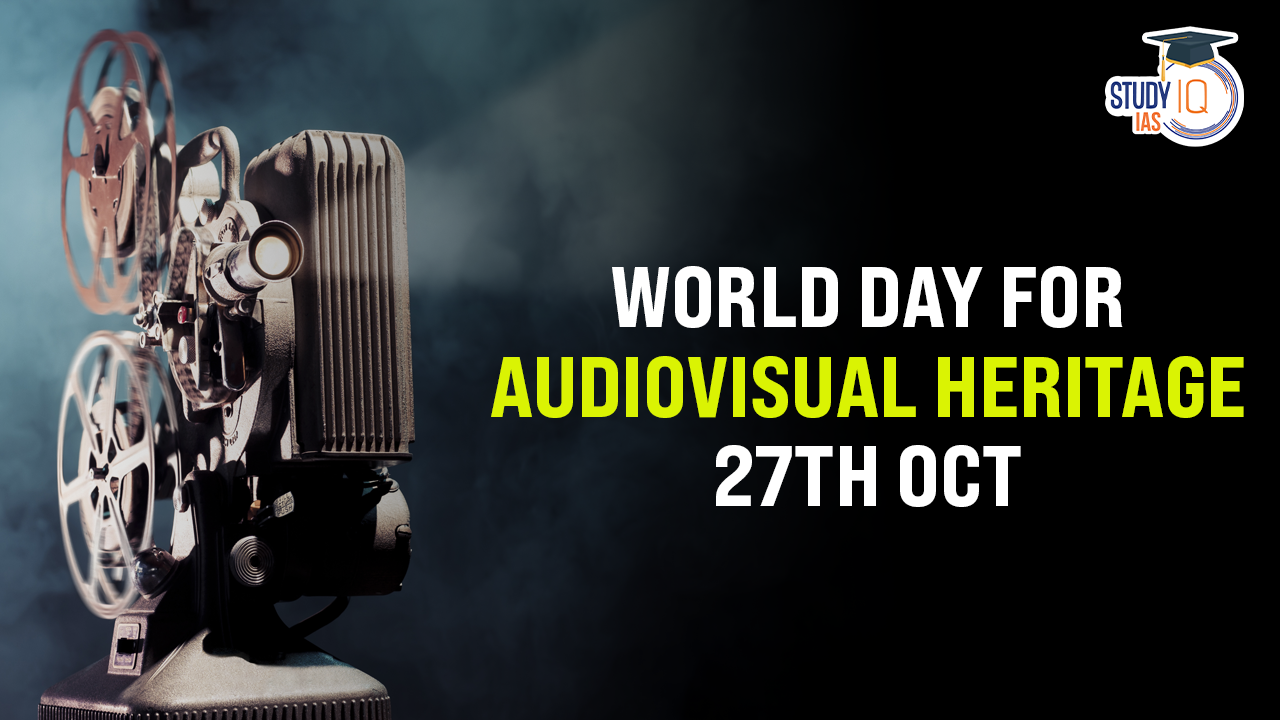Table of Contents
The World Day for Audiovisual Heritage, celebrated every year on October 27, is a UNESCO-designated event dedicated to the preservation and appreciation of audiovisual heritage, including films, audio recordings, broadcasts, and multimedia files. This day highlights the importance of safeguarding these materials that capture the rich cultural and historical narratives of societies worldwide. For UPSC aspirants, understanding this observance is crucial, as it covers key aspects of cultural preservation, heritage management, and the role of UNESCO, making it relevant for topics like history, culture, and international organizations.
Date of World Day for Audiovisual Heritage 2024
The World Day for Audiovisual Heritage will be celebrated on October 27, 2024. Each year, on this date, the global community comes together to raise awareness about the importance of preserving and safeguarding audiovisual records. These materials provide an authentic glimpse into historical events, cultural expressions, and personal memories, which enrich humanity’s shared heritage.
Theme for World Day for Audiovisual Heritage 2024
Every year, a unique theme is selected to focus on specific aspects of audiovisual preservation. While the official theme for 2024 is yet to be announced, it will likely underscore the role of advanced digitization and preservation techniques in ensuring continued access to these invaluable resources. This theme will serve as a reminder of the collaborative efforts needed across the globe to secure the legacy encapsulated in audiovisual materials.
For UPSC aspirants, it is beneficial to keep track of annual themes, as they often reflect UNESCO’s evolving approach to heritage preservation and provide insight into global cultural initiatives.
Historical Background of World Day for Audiovisual Heritage
The origins of the World Day for Audiovisual Heritage date back to 1980 when UNESCO recommended the preservation of audiovisual records due to their vulnerability to decay and obsolescence. The adoption of Resolution 53 at UNESCO’s 33rd General Conference led to the formal establishment of the World Day for Audiovisual Heritage on October 27. The day was first observed in 2005 as a call to action for nations and cultural institutions worldwide to recognize the importance of audiovisual heritage.
UNESCO’s Memory of the World Programme, launched in 1992, aligns closely with the objectives of World Day for Audiovisual Heritage. The Memory of the World Programme is aimed at documenting, preserving, and providing access to humanity’s documentary heritage, including fragile audiovisual materials that may otherwise be lost due to lack of resources, environmental conditions, or technological obsolescence.
Significance of World Day for Audiovisual Heritage
The observance of World Day for Audiovisual Heritage is significant for various reasons:
- Preservation of Cultural and Historical Narratives: Audiovisual materials like films, audio recordings, and broadcast tapes capture the essence of historical events, cultural traditions, and personal stories. These records serve as essential resources for researchers, historians, and future generations, offering insight into our shared cultural identity.
- Raising Awareness about Fragile Media: Audiovisual heritage is highly vulnerable to decay and technological obsolescence. As analog formats become outdated, digitization is necessary to protect these materials. However, the process requires specialized expertise and equipment, which are often costly. World Day for Audiovisual Heritage helps raise awareness about the resources and expertise needed to preserve these delicate formats.
- Highlighting the Role of Audiovisual Preservation Professionals: Audiovisual archivists and preservationists play an indispensable role in saving these cultural assets from oblivion. This day honors their work and encourages institutions and governments to invest in the preservation of audiovisual heritage.
- Encouraging Global Collaboration: The preservation of audiovisual heritage is a global concern. UNESCO, through initiatives like the World Day for Audiovisual Heritage, encourages countries, institutions, and the public to collaborate and participate in activities that enhance access to cultural heritage. These efforts contribute to cross-cultural understanding and tolerance.
- Education and Public Awareness: Audiovisual materials act as powerful educational tools, making historical knowledge more engaging and accessible. This observance helps educational institutions and the public acknowledge the unique ability of audiovisual media to convey history in dynamic, impactful ways.
Role of UNESCO in Audiovisual Heritage Preservation
UNESCO has been at the forefront of efforts to safeguard audiovisual materials, understanding that the preservation of these records is essential for sustaining the collective memory of humanity. Through initiatives like the Memory of the World Programme, UNESCO provides guidelines, technical assistance, and resources for the digitization and preservation of audiovisual archives.
UNESCO’s advocacy emphasizes that without proactive measures, many of these invaluable resources may be lost forever, depriving future generations of access to historical events, cultural diversity, and traditional knowledge.
Challenges in Audiovisual Preservation
Preserving audiovisual heritage is a challenging task, as audiovisual materials face unique threats compared to other forms of documentation:
- Chemical and Physical Decay: Audiovisual materials, especially those in analog formats, are prone to deterioration due to factors like chemical reactions, temperature fluctuations, and humidity.
- Technological Obsolescence: As technology advances, older formats like VHS tapes, cassettes, and film reels become obsolete, requiring specialized equipment and expertise to access and digitize the content.
- Lack of Resources and Funding: Preservation efforts often face financial and logistical constraints, as digitization processes can be costly. There is also a shortage of trained professionals in this field.
- Legal and Ethical Concerns: Copyright laws and intellectual property issues can complicate efforts to digitize and share audiovisual content, particularly for materials with multiple creators or those stored in private collections.
- Limited Access in Developing Regions: Many developing countries lack the necessary infrastructure, funding, and expertise to preserve their audiovisual heritage adequately, which can lead to the irreversible loss of culturally significant materials.
Ways to Celebrate World Day for Audiovisual Heritage
The World Day for Audiovisual Heritage can be celebrated through various activities that promote the preservation of audiovisual materials and raise public awareness:
- Digitization Initiatives: Libraries, archives, and cultural institutions can organize digitization workshops and encourage volunteers to participate in preservation activities.
- Exhibitions and Screenings: Public screenings of restored films, documentaries, and other audiovisual materials can help educate communities about the importance of preserving cultural heritage.
- Educational Seminars and Workshops: Universities, museums, and cultural organizations can host seminars on audiovisual preservation, highlighting the challenges and best practices in the field.
- Social Media Campaigns: UNESCO and other organizations often launch social media campaigns to reach a broader audience. Engaging in these campaigns and sharing content related to audiovisual heritage can help spread awareness.
- Collaborative Efforts: Countries, institutions, and non-governmental organizations can collaborate on projects that aim to preserve and provide access to at-risk audiovisual heritage.
World Day for Audiovisual Heritage UPSC
The World Day for Audiovisual Heritage on October 27 serves as an annual reminder of the value of audiovisual materials and the need for their preservation. Audiovisual heritage provides a unique perspective on human history, capturing the emotions, sounds, and images of the past in a way that written documents often cannot. For UPSC aspirants, this observance is a noteworthy example of global efforts to safeguard cultural identity, making it a relevant and insightful topic for exams. UNESCO’s commitment to audiovisual preservation emphasizes the importance of this heritage, not only as historical records but as an essential component of our shared global identity.


 GPS Spoofing and Its Impact in India: A ...
GPS Spoofing and Its Impact in India: A ...
 Amrit Gyaan Kosh Portal: A Comprehensive...
Amrit Gyaan Kosh Portal: A Comprehensive...
 UpLink Initiative: Launched by World Eco...
UpLink Initiative: Launched by World Eco...





















